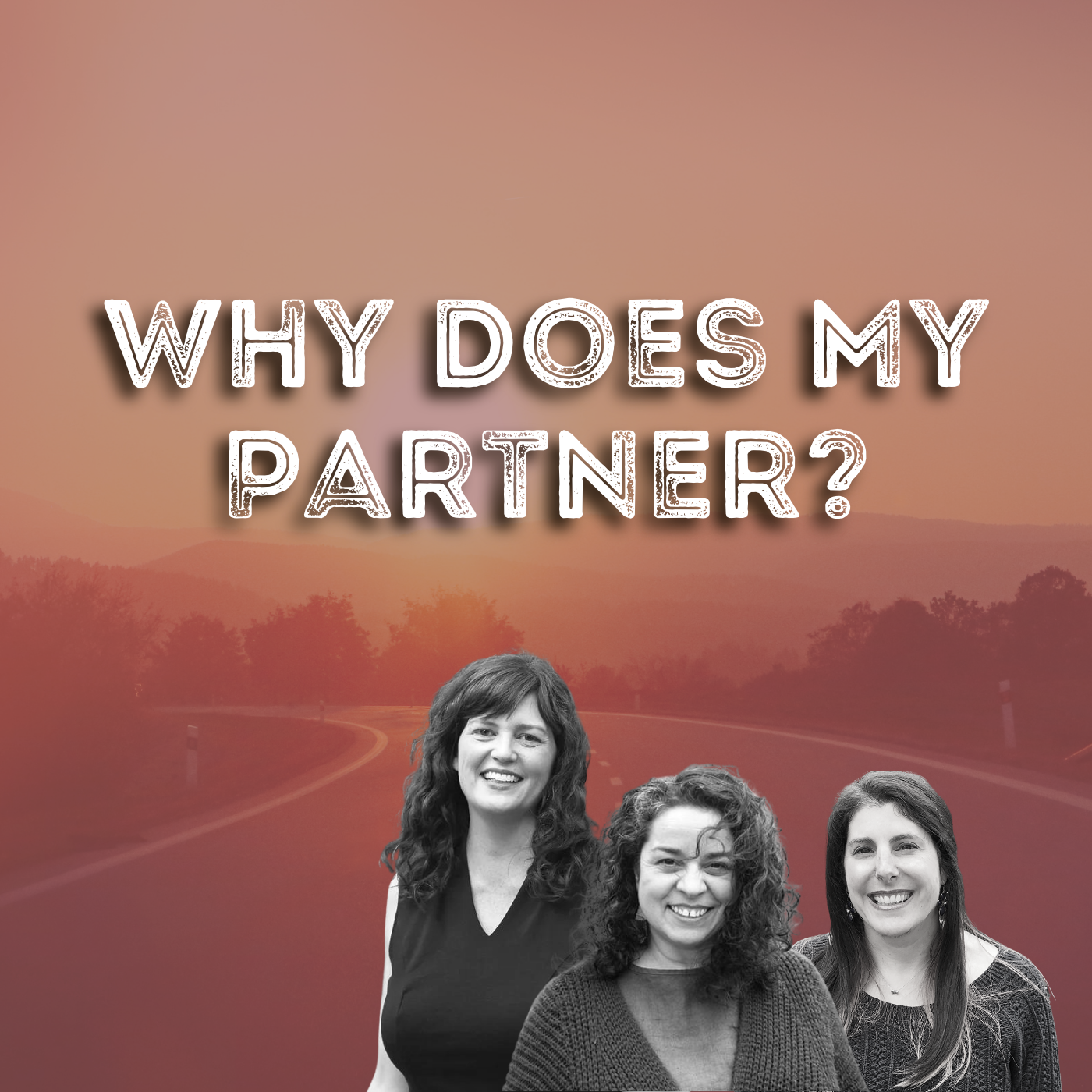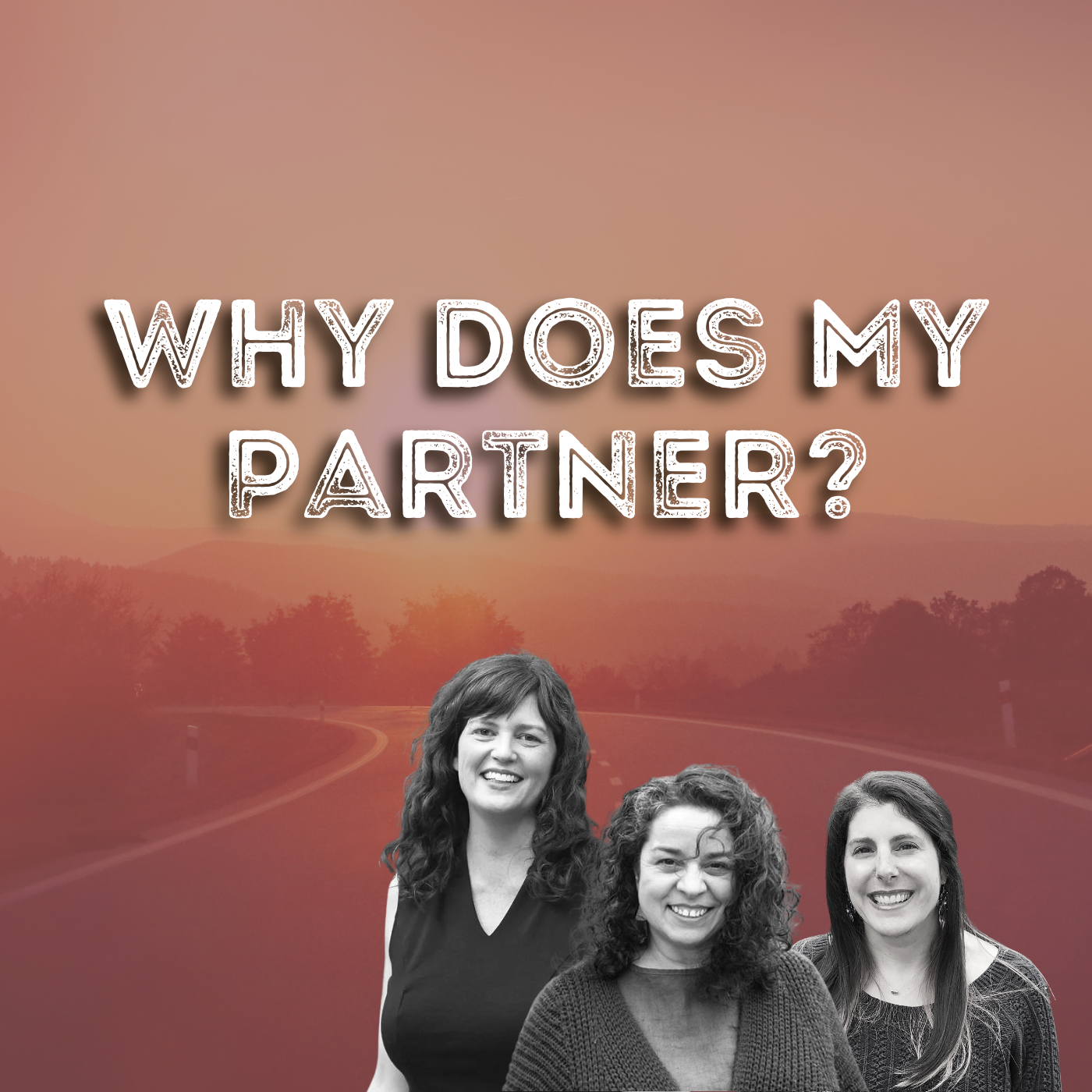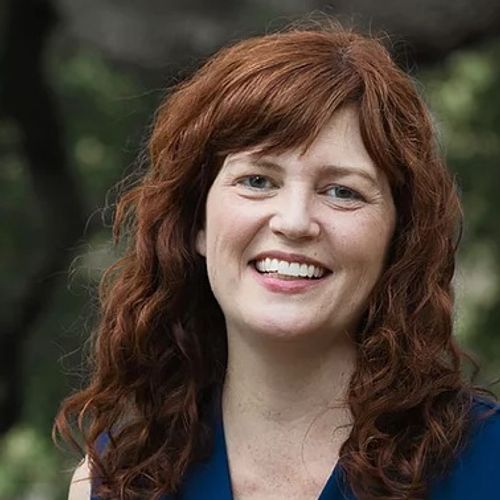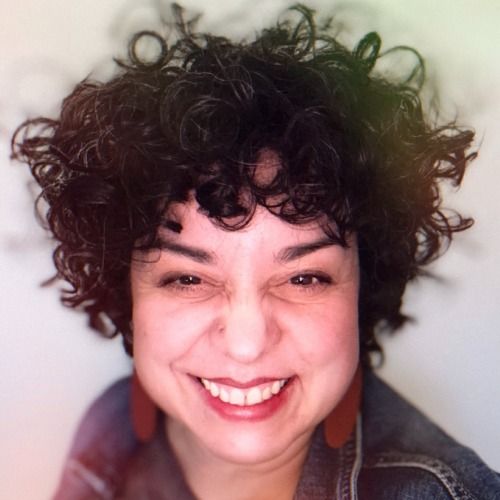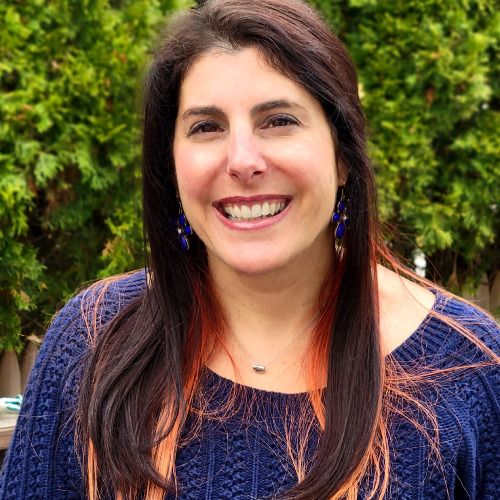Episode 106
Why Doesn't My Partner Take Care of Me When I'm Upset?
Dear listeners, before you start listening to this episode, would you try something with us?
Sit back in your chair. Take a breath for a second. Notice that you’re alive and breathing. Notice the sensations in your body that tell you that you’re alive. As other thoughts start to pop up, don’t try to push them away just yet instead just let yourself notice that they’re there. Notice them, and now go back to your breath. Take your time. What’s happening inside you now?
This, dear listeners, is withnessing, and it’s what this episode is all about. Or listener question speaks to a deep desire to be taken care of by their partner, so we start by asking, “what kind of state are each of your brains in? When you’re worked up and upset, your brain is going to have a really hard time giving or receiving support, even when that feels like what you want to do most in the world.
So take a second to slow down. Witness what’s happening inside you and give your brain a chance to shift into a state that’s more interested in connection and bonding. Showing up for yourself is where it all starts.
Quotes:
The part of your brain that's going to help you shift from one state to another is going to be activated when you slow down and watch what's happening right now inside you.
In order to be there for my partner…I don't have to worry about how to soothe them. I only have to worry about how to witness me.
There is something so empowering about knowing I don't have to wait for my partner to be integrated enough to support me. I can do this for myself.
This episode is brought to you by our amazing sponsor, The Academy of Therapy Wisdom. Jules is one of their many educators, and because you listen to us, the Therapy Wisdom team is offering a secret code to give you free access to one of Jules' 1 hour Wise Conversations. Just visit therapywisdom.com and use the discount code "WDMP."
Jules' new book is out now! Buy Setting Boundaries that Stick: How Neurobiology Can Help You Rewire Your Brain to Feel Safe, Connected, and Empowered wherever books are sold.
Share your questions with us at whydoesmypartner.com/contact
If you want to dive in deeper, consider attending our upcoming workshops. Learn more at whydoesmypartner.com/events
Transcript
Welcome to the Why Does My Partner podcast.
Rebecca:I'm Jules.
Rebecca:I'm Vicki.
Rebecca:And I'm Rebecca.
Rebecca:We're your hosts.
Rebecca:We're also couples therapists and messy humans bumbling through our own relationships every day.
Rebecca:We
Vickey:met at a training, and our secret sauce is that we, and our partners, became fast friends.
Vickey:Between us, we have more than 40 years of experience holding hard relational questions with our clients.
Vickey:We're going to bring those questions here.
Jules:And together, we're going to take a stab at answering those questions.
Jules:This podcast is not a substitute for couples therapy.
Jules:If something you hear in this podcast stirs something deep within you about your relationship, reach out to a couples therapist in your area.
Rebecca:We also love to hear your questions.
Rebecca:So don't forget to go over to whydoesmypartner.
Rebecca:com to leave a question of your own.
Rebecca:Here's today's question.
Jules:Welcome back.
Jules:I'm Jules.
Jules:This
Rebecca:is Vicki.
Rebecca:And I'm Rebecca.
Rebecca:Today's question.
Rebecca:Why doesn't my partner take care of me when I'm upset?
Rebecca:When I'm hurt and angry, I want my partner to take care of me.
Rebecca:And I just don't understand why they can't see what I need in that kind of moment.
Rebecca:We've been together for so long.
Rebecca:It's like, they don't know me or something.
Jules:Awww.
Jules:Vic and I made the same voice at the same time.
Jules:And I don't usually,
Vickey:but oh, this one does
Jules:touch my heart.
Jules:Sweet one.
Jules:Yeah.
Jules:You know what?
Jules:I want that too.
Jules:I want There are parts of me that really, really long for, uh, gentleness and caretaking and getting that I'm upset, hopefully, by the way, without me
Jules:having to say anything, and, and also to really, like, Take on soothing me.
Jules:I get it.
Jules:But even when I do say something,
Vickey:I'm realizing now, like, sometimes I say to Gabe, like, why can't you say this right now or do this for me right now?
Vickey:Yeah.
Vickey:And typically it's because he's just as upset
Jules:as I am.
Jules:Well, this is part of why.
Rebecca:But this is, this is brain state stuff.
Rebecca:Yeah.
Jules:Yeah, this is why it doesn't work.
Jules:Well.
Jules:Right?
Jules:One of you.
Rebecca:It's, it's like a lot of folks that call me and they're, they're, they're looking to do some work together.
Rebecca:Like I'm talking to a lot of folks about intensives lately and they all call and everybody says, Oh, we're having a hard time communicating.
Jules:Oh yeah.
Jules:Right.
Jules:Yeah.
Jules:Yeah.
Jules:That's, that's my number one request.
Jules:It's the
Rebecca:number one, right?
Rebecca:Mm hmm.
Rebecca:Yeah.
Rebecca:And I always ask this question, I'm like, are you like always having a hard time communicating or is it like you have a hard time communicating when you're like, upset about something
Rebecca:or there's a lot of charge in the room or, yeah, like, that's good clarification, right?
Rebecca:Like, are, are you, when it, when it's when you're flooded, is it harder to communicate or is it like Mm-Hmm.
Rebecca:always across the board that you can't communicate with each other and Mm-Hmm.
Rebecca:like nine and a half times outta 10.
Rebecca:mm-Hmm.
Rebecca:. It's like, oh, well there's something else going on.
Jules:Yeah.
Jules:Right?
Jules:Yeah.
Rebecca:Yeah.
Rebecca:And I'm thinking about that here too, because it's like, why doesn't my partner take care of me when I'm upset?
Rebecca:Well, what's going on there?
Rebecca:There's, there's something else going on.
Rebecca:There's, there's a, when we're flooded, when, uh, we're, we're, we're picking up or sensing an agenda in our partner or we're feeling a lot of shame or blame or judgment, yeah, right.
Rebecca:Like when, when that's the stuff that's kind of happening, we, we kind of go offline and whether, and when we're offline in that way and we're wanting our partner to take care of, But oftentimes
Rebecca:what I'm noticing in couples is that when one person's offline, the other partner is too.
Vickey:Yeah.
Vickey:So why is your partner not
Jules:choosing you?
Jules:They're probably not in a brain state that supports connection and bonding behaviors in that moment.
Jules:Right.
Jules:This is actually, so what happens in a neurobiological sense is that the brain state comes first and supports particular abilities.
Jules:And then other brain states support other abilities.
Jules:So like, fast reactivity, um, moving your body quickly, moving into old defenses is supported by brain states that function when we're scared,
Jules:when we are sensing danger of some kind or like something's going wrong.
Jules:Um, What do you mean by old defenses?
Jules:Like, old ways that I've learned over the course of my life that work to keep me alive in hard moments.
Jules:Basically, the brain is marking, like, I yelled and then it stopped.
Jules:Check.
Jules:That
Vickey:worked.
Vickey:Right.
Vickey:Okay.
Vickey:Right?
Jules:I yelled and the fight stops.
Jules:Then I have good data that says if I yell loud enough and hard enough, then I will get out of this hard moment.
Jules:The bad, the bad stops.
Jules:And, and.
Jules:In that kind of moment, long term consequences are not actually an available thought process.
Jules:So we need to shift the brain state to a state that is more interested in connection and bonding in order to be able to be with each other.
Rebecca:Can I get like a little nuanced with you?
Rebecca:Yeah, yeah.
Rebecca:Because I hear you say we need to shift the brain state into a state that's more interested in connection and bonding and When I heard the word interested, my brain quickly shifted to available.
Rebecca:It's more available.
Rebecca:Yes,
Jules:I think you're absolutely right.
Jules:Absolutely correct that because I want to be really clear about this.
Jules:This is a physiological difference.
Jules:It is not possible to be, to be interested or to have this capacity available in some brain states and it is available in other brain states.
Jules:So like, it's not like a wanting or it's not like a
Rebecca:choice.
Rebecca:If I'm having a panic attack.
Rebecca:Right.
Rebecca:And, and I, I don't know about what, but I'm having a panic attack and I'm totally flooded and my partner is upset that I'm having a panic attack and needs me to figure out how to take care of them.
Rebecca:I'm not going to have the capacity or availability in that moment.
Rebecca:I might have the capacity in that moment.
Rebecca:I'm, my brain state is not available.
Jules:Right, right, right.
Jules:That brain state does not support that.
Jules:And by the way, your partner, who is really upset in that moment, probably does not have the brain state available to you either.
Jules:To help you with your panic attack in any way, or be soothing during your panic attack in any way.
Jules:And I'm not saying How on earth do you get there?
Jules:Right?
Jules:This is what I love.
Vickey:We're saying it like it's easy of like, okay, you just have to get curious.
Vickey:You just have to get to a different brain state.
Vickey:Yeah.
Vickey:No,
Rebecca:no, no, no.
Rebecca:How?
Rebecca:So, yeah.
Rebecca:A couple asked me this recently.
Rebecca:They were asking me like, um.
Rebecca:It came off a little differently.
Rebecca:It was like, um, Rebecca, why, why are you always talking to us about how to like, watch our own brain, right?
Rebecca:Like we've been to other couples therapists in the past and they keep telling us that we have to be there to support each other in some capacity.
Rebecca:Why do you keep telling us to watch ourselves?
Jules:Mm hmm.
Jules:Because that is the how.
Jules:Mm hmm.
Jules:So people are always asking, How?
Jules:How?
Jules:How do you do this?
Jules:And I'm, I'm, I love those questions.
Jules:I'm the how person.
Jules:Great question.
Jules:Let's talk about how.
Jules:And, and I can't tell you, Do this, do this, do this, do this, in this order.
Jules:Because that's actually, um, The how is a little bit more unique to each person.
Jules:Mm hmm.
Jules:But the principle of the how is the same for everybody.
Jules:The part of your brain that's going to help you shift from one state to another is going to be activated when you slow down and watch what's happening right now inside you.
Rebecca:Can we give an example?
Jules:Go for
Rebecca:it, please.
Rebecca:Well, like, I'm just thinking like, like right now live for our listeners.
Rebecca:Yeah, yeah.
Rebecca:If we just like ask you to
Rebecca:just take a breath for a second and just notice like, Hey, you're alive and you're breathing.
Rebecca:And what
Jules:helps you know that?
Jules:Yeah.
Jules:You know what happened in my brain just now, and I'm going to do this live for folks so you can see what I mean when I say this, um, we'll watch whatever is.
Jules:So Rebecca's telling me witness my breath and what just happened was a flood of things I'm about to have to do.
Jules:So I got flooded with all these thoughts and images of where I'm about to go.
Jules:So I'm just noticing, oh, I'm witnessing the hello list of stuff I have to do before my daughter goes to bed tonight.
Jules:I see you, I see all the images there of all the different things I gotta do.
Jules:And move around and stuff.
Jules:There's a big thing happening in my house tomorrow, so we got some furniture to move around and and so I've got that list going and that's me witnessing the list.
Jules:I'm not being taken over by the list.
Jules:And then I remembered the breath thing just now and I felt my breath and I felt it as I did the butterfly in my back opened up a little bit wider.
Jules:It's almost like that.
Jules:Oh, coming back to the breath and out of the list helped my breath expand a little bit more.
Jules:And even as I'm doing this, there are tingles going down.
Jules:It's like they're going off my shoulders and down off the sides of my arms, down my back a little bit.
Jules:Cause even coming into this state where I'm witnessing my own mind a little bit is going to bring me into regulation.
Jules:And how does that happen?
Jules:Well, there's a neurochemical GABA.
Jules:That is being released when I move into the state and it's going to calm down my subcortical brain and help my brain come into more integration, which is
Jules:just a state where we have different brain systems talking more to each other.
Jules:And so it's subtler, it's more nuanced, it's a little softer, and this is where connection states live.
Jules:is in this more nuanced state.
Jules:So it's like in order to be there for my partner, I am so empowered because I don't have to worry about how to soothe them.
Jules:I only have to worry about how to witness me.
Rebecca:Right.
Rebecca:Can I, can I like be with you inside of this?
Rebecca:And thank you so much Jules for illustrating and really giving us a chance to witness you witnessing you.
Rebecca:That was fun to
Jules:say.
Jules:Yeah.
Jules:We're going real meta.
Jules:I know.
Jules:It's so cool.
Jules:I can live in this space.
Jules:Right.
Rebecca:I do.
Rebecca:Um, but here's, here's the thing.
Rebecca:As we were witnessing you, witnessing you, what happens is that we realize, oh, there actually doesn't need to be like any judgment happening in that.
Rebecca:It's just a witness.
Rebecca:Mm hmm.
Rebecca:Yeah.
Rebecca:Right?
Rebecca:And I like to sometimes call it with nessing.
Rebecca:Mm hmm.
Rebecca:Right?
Rebecca:Because it's like, whoa, when I turn my attention inward and I'm watching what's happening, there's also this other sort of thing that starts happening in my system where I go, oh, yeah.
Rebecca:I notice just like even the tone of that, oh, yeah, oh, I got distracted.
Rebecca:Oh.
Rebecca:Of course I did.
Rebecca:Yeah.
Rebecca:There's that tag inside tone is very gentle.
Rebecca:And it's really itchy.
Rebecca:But notice that.
Rebecca:Right?
Rebecca:Yeah.
Rebecca:So, so there's, there's something shifting in there.
Rebecca:And so there's like, there's a withness.
Rebecca:I'm suddenly like, I'm not really, if I was feeling flooded and I was feeling really alone, when I turn my attention inward, something about that shifts.
Rebecca:Because now I'm with myself.
Rebecca:Mm hmm.
Rebecca:Mm hmm.
Jules:Mm hmm.
Jules:Mm hmm.
Jules:Yeah, totally.
Jules:Well, I think this is really about you move into relationship between you and you and that changes the neurochemistry and makes it so that you're more available to be in relationship with us.
Jules:And by the way, person who asked this question, I am I'm Uh, for all of us who have this kind of question, I'm just noticing if I stay in that upset hurt space, even if
Jules:my partner does that U turn and starts witnessing their mind, witnessing their mind, and then comes to me with soothing or comes to me with kindness, I may even miss it.
Jules:Because my brain state is so activated, I can't catch that they're trying to be supportive in the first
Vickey:place.
Vickey:Because actually, that hurt, hard, urgh,
Jules:is not a good receiving state.
Jules:Right.
Jules:Because it does not do connection and bonding physiologically.
Rebecca:And so why is it that we spend so much energy talking about the brain states?
Rebecca:It's in part because that allows us to both actually.
Rebecca:Turn towards the relational space.
Rebecca:Mm hmm.
Rebecca:Mm hmm.
Rebecca:Right?
Rebecca:And receive from the relational space because it is really, when, when our brain states are in a more, um, flooded, flipped place or, uh, judgy, uh, shame, blame kind of agenda type place.
Rebecca:Mm hmm.
Rebecca:We're not, we're just not available to receive the care that our, that our partner might be offering us.
Rebecca:Right.
Rebecca:Right?
Rebecca:Mm hmm.
Rebecca:Right.
Rebecca:Or to give it.
Rebecca:Right.
Jules:Yeah.
Jules:Mm hmm.
Jules:Yeah, yeah.
Jules:And so what?
Jules:The kind of stuff we're talking about, we're going to be talking about at a workshop we have coming up in just a couple weeks.
Jules:Um, so if you like these ideas, you go, Oh, wait, I want to dive deeper into this.
Jules:It's online.
Jules:So you do not have to travel.
Jules:It is live.
Jules:is small group.
Jules:It is highly interactive.
Jules:Um, so we will be talking about lots of hows and helping each person who comes to the workshop find their own very particular, very unique how.
Jules:Um, so we're really excited to be able to meet you all in that space and we sure hope you can come to it.
Jules:And it's called
Rebecca:integrating mind and heart.
Rebecca:Yeah.
Rebecca:You can find
Jules:info at our
Rebecca:website.
Rebecca:Yeah.
Rebecca:Whatismypartner.
Rebecca:com.
Rebecca:Yeah.
Rebecca:So
Jules:So finding your own unique version of turning towards yourself to be in relationship with yourself so that I can be in more relationship with my partner.
Jules:Yeah.
Jules:It's like, uh, it's, this is true for all complex systems.
Jules:We go differentiation first and then back into relationship link comes second.
Jules:And so, um, we're, we're going to be really leaning into that.
Jules:In order to give you the support you want, because the thing is, this listener asked for the right thing.
Jules:Of course you want to be supported.
Jules:And I want you to be able to take it in, and I want your partner to be able to be there with you.
Jules:Which means we do a U turn first.
Jules:I'm having a
Rebecca:moment here.
Rebecca:Oh, tell me.
Rebecca:I'm like dancing in my seat a little bit.
Rebecca:Yeah, you are.
Rebecca:I see that.
Rebecca:As I hear you talk, about differentiation first, link second.
Rebecca:And I've heard you, I've heard you talk about that a lot, Jules.
Rebecca:And all complex systems move in this way.
Rebecca:I'm thinking, ah, yeah.
Rebecca:And, but, um, when we're born into this world, we're linked with someone and we're in utero, like there, there isn't the differentiation.
Rebecca:And it takes quite a while for us to figure out that we're not the same as our mothers.
Rebecca:And that is that they're not actually like mind reading.
Rebecca:And, And like, and there's some kind of like, Oh, but that's a kind of what we're wishing for inside of this question is like, can we get back
Jules:to that?
Jules:And no, I'm so sorry.
Jules:Yeah.
Jules:And that's the thing.
Jules:Yeah.
Jules:And this is, I actually asked, uh, colleagues with a guy named Dan Siegel who talks a lot about this stuff.
Jules:And I, I had, uh, the, a moment where we were, we were one on one.
Jules:And I asked him that exact question.
Jules:I said, Dan, when I've been studying complexity theory and mathematics, it's, it's not differentiation and linkage, not differentiation first and linkage second for every complex system.
Jules:It's just that both have to be present.
Jules:Why do you always say differentiation first, link second?
Jules:He said, because we start linked.
Jules:And so we have to add the other piece.
Jules:And so we go differentiation, first link, second, because we're so in linkage that we start adding, um, that integrative capacity in a complex system by adding the other piece.
Jules:And so we're going to move back and forth between both of them.
Jules:Of course, both are going to be present.
Jules:Of course, we were born in linkage.
Jules:And of course there's some inner longing to be held and met with In utero, there is no temperature need, there is no food need, there is no breath need, there is no
Jules:need, there's no need, it's existence without need, and no, we don't get to go back.
Jules:On the flip side,
Vickey:by the way, when I'm, Thinking about this myself or with my clients and talking with them, there is something so empowering at
Vickey:knowing I don't have to wait for Gabe to be integrated to support me.
Vickey:Right.
Vickey:I can do this for
Jules:myself.
Jules:Yeah.
Jules:That's exactly right.
Jules:I don't have to rely on
Vickey:the other person.
Vickey:I mean, like, again, in utero sounds glorious and it is totally reliant on the other person.
Vickey:Right.
Vickey:And it's nice that in, in adulthood, I don't have to rely on someone anymore.
Vickey:I can do this for me.
Vickey:Absolutely.
Jules:Exactly, and of course you want the other person to show up as well.
Jules:Yes.
Jules:Yes.
Jules:And ask for it.
Jules:Yes.
Jules:And ask loudly if you need to.
Jules:And ask vehemently and passionately.
Jules:I love that.
Jules:And also.
Jules:Oh, you don't have to be dependent on somebody else to be okay.
Jules:Right.
Vickey:And thank you for the way you just phrased that.
Vickey:I do want to point out, ask, and like you said, ask.
Vickey:If you have a partner who really is like
Jules:really unavailable to
Vickey:support you and really unwilling like ever, ever, that's a whole different thing.
Vickey:Yeah.
Vickey:Like there could be an actual issue going on.
Vickey:There is something hard there.
Vickey:Yeah.
Vickey:So like look into that.
Vickey:Um, but this is more on the like, I'm upset in the car and because it happened we got home and I was upset about something.
Vickey:And I was like, can't you just right now, and he was like, no,
Jules:no, he's flipped.
Jules:He's flipped.
Jules:He's triggered.
Rebecca:I think you're naming something there.
Rebecca:That's also in this question as you're saying, can't you just, and I was upset.
Rebecca:And in this question, it's, why can't my partner when I'm upset at?
Rebecca:You know, when I'm hurt or angry, here, here we have a clue that maybe it's not just about what the partner can or can't do, but that the person asking the
Rebecca:question here is also like in a brain state that isn't really able to receive.
Jules:Right.
Jules:Both, both need, both people, uh, shifting, uh, really helps in the support giving and in the receiving part.
Jules:And I want to just note, um, When I'm in that more triggered state or really upset, I'm not in a brain state that's really good at, um, doing that connection bonding.
Jules:You know what?
Jules:I do forget who my partner is.
Jules:Mm hmm.
Jules:Mm hmm.
Jules:In that moment, but it's not like I don't know him.
Jules:As a whole.
Jules:And it's not like I don't know him, um, in the, in all of the slings and arrows and waves and love of our relationship.
Jules:I do.
Jules:But that knowledge is unavailable to me in that
Rebecca:moment.
Rebecca:I'm thinking as you're saying this, Jules, that in that moment for me, as I witness myself now, when I have those moments, Something that happens for me is
Rebecca:I'm often in a more protective state, like we talked about in our last episode.
Rebecca:Yeah.
Rebecca:And so, when I'm there, I'm orienting to, um, all the ways maybe he isn't caring for me or all the things that I need to protect against, right?
Rebecca:And so, like, I'm kind of looking for confirmation that I'm right in that, and it's so easy then to miss all the other stuff because that's not what my brain is orienting towards.
Rebecca:Thanks.
Jules:Totally.
Jules:And when you're in that space, by the way, so I'm in my upset, uh, hard, sad space or angry space as, as I watch him maybe not look that supportive to me and maybe it looks like he doesn't know me.
Jules:Uh, I don't know him either in that moment.
Jules:Let's remember
Rebecca:that part.
Rebecca:And I get very, very self focused in that space, right?
Rebecca:So like I'm doing a lot of like navel gazing or like, you know, there's, there's maybe Uh, some anger coming out, some anger going in, right?
Rebecca:Like it's, It's, it's moving in, in ways that are not supportive of us finding each other.
Jules:Right.
Jules:Finding each other in hard moments, which is where we're, what
Rebecca:we're after.
Rebecca:Right.
Rebecca:Yeah.
Rebecca:So, so that's the stuff that we're covering in our integrating mind and heart workshop.
Rebecca:Um, I have one more thing to add to celebrate with y'all as this is our last episode of season six.
Rebecca:Oh my gosh.
Rebecca:It's also, it's also.
Rebecca:Our 106th episode of the podcast.
Rebecca:That's amazing.
Rebecca:106
Jules:episodes.
Jules:This would not be possible if you were not listening, so thank you so much for listening.
Jules:Oh my gosh,
Rebecca:thank you.
Rebecca:And I have, I have one request, dear listeners, if you could take a moment and go over on whatever listening app you're listening on and
Rebecca:rate us and review us, it would be the biggest gift in the world.
Rebecca:Um, so thank you so much for being with us for 106 freaking episodes.
Jules:Amazing.
Jules:And we'll see you soon back here on the podcast for a mini series.
Jules:We're cooking up some wonderful things.
Jules:We've got some nuts.
Jules:fun new questions, and hopefully we'll see you at the workshop integrating mind and heart as well.
Jules:Take
Rebecca:care.
Rebecca:Bye.
Rebecca:Bye.
Jules:That wraps up this week's episode.
Jules:Join us again next week for another Why Does My
Rebecca:Partner?
Rebecca:We hope that you continue to listen wherever you get your audio and that you'll follow the show.
Vickey:To go deeper, join us at one of our workshops.
Vickey:You'll find our next date at whydoesmypartner.
Vickey:com.
Jules:Did you know you can ask us your questions?
Vickey:Thanks!
Vickey:Your questions are relational gold.
Rebecca:Go to why does my partner.
Rebecca:com to either write in or record your question for a future episode.
Jules:And here's some gratitudes.
Jules:Thanks to Al Hubberman, our sound editor and podcast production magic maker.
Jules:Thanks
Vickey:to every one of you who has joined us for our workshops in the past.
Vickey:We've learned so much from
Rebecca:all of you.
Rebecca:And thanks to everyone who's reviewed the show and Apple podcasts, your reviews help others to find the show, take care of each other best.
Rebecca:You can see you next time.
